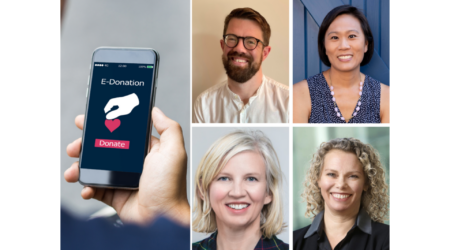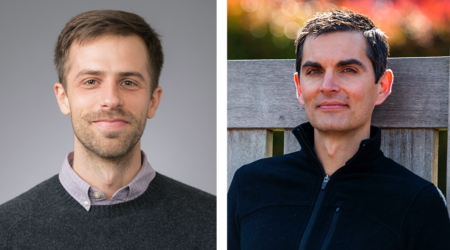Recorded on September 30, 2022, this Matrix “Author Meets Critics” panel focused on the book Work Pray Code: When Work Becomes Religion in Silicon Valley, by Carolyn Chen, Associate Professor in the UC Berkeley Department of Ethnic Studies.
Work Pray Code explores how tech companies are bringing religion into the workplace in ways that are replacing traditional places of worship, blurring the line between work and religion and transforming the very nature of spiritual experience in modern life. Chen spent more than five years in Silicon Valley, conducting a wealth of in-depth interviews and gaining unprecedented access to the best and brightest of the tech world. The result is a penetrating account of how work now satisfies workers’ needs for belonging, identity, purpose, and transcendence that religion once met.
Professor Chen was joined in conversation by Arlie Hochschild, Professor Emerita in the UC Berkeley Department of Sociology, and Morgan Ames, Assistant Professor of Practice in the UC Berkeley School of Information and Associate Director of Research for the Center for Science, Technology, Medicine and Society. The conversation was moderated by Marion Fourcade, Professor of Sociology at UC Berkeley and Director of Social Science Matrix. The event was co-sponsored by the Berkeley Center for the Study of Religion and the Berkeley Culture Center.
“This is such a quintessentially important topic — how people find meaning in their lives, and how the institutions they are part of shape those meanings,” Fourcade said in her opening remarks. “I’m excited because it’s Silicon Valley, which I’m a bit obsessed about… and I’m excited because the book is really a beautiful exemplar of a classical sociological approach to religion, and also a classical sociological approach to work.”
“I came to the study of work in Silicon Valley by accident,” Chen explained in her presentation of the book. “I was interested in capturing religious presence among the non-religious, so I started first by looking at religion and spirituality in secular spaces. And I started by studying yoga practitioners. I asked yoga practitioners about how, when, and why they practiced yoga, but they kept talking to me about work. I had gone in thinking that yoga was the sacred practice because of its connection to Hinduism. But I was mistaken. Yoga wasn’t sacred, work was. Yoga practitioners told me stories about how they had sacrificed and surrendered their time, energy, and devotion to work. And according to Emile Durkheim, they had set their work apart and made it sacred. So I’ve realized that I’d been looking for the sacred in the wrong place. If I really wanted to understand religion and contemporary where America, I needed to be studying the workplace.”
Chen said that her ethnographic fieldwork included spending time with workers in tech firms; she interviewed more than 100 people in the industry. “I had many gourmet lunches, I attended exercise and dance classes, I attended professional development seminars and executive coach trainings. And yes, I even participated in trance dance. I meditated with tech workers a lot,” she said.
Some workers have largely abandoned their traditional religious practices after joining Silicon Valley firms, Chen said. “America’s highly skilled have not abandoned religion; instead, they find it at work,” she said. “More and more companies have become America’s new temples, churches, and synagogues. People are not selling their souls at work, rather work is where they find their souls.”
She described meeting one tech worker who “used Christian language to describe the company’s mission, saying over and over again to me that he had a ‘burden to come up with this thing that’s going to change the world’ …and that ‘you’ve got to drink the Kool Aid, you have to believe that your company is one of those one out of 10 that’s going to make it’.”
She pointed out that companies have embraced their role as providers of “spiritual cultivation” largely because it serves their interests by boosting workers’ productivity and sense of commitment. “Professionals are looking to work for identity, meaning, purpose, and even transcendence — and companies, for their part, have taken up spiritual care and spiritual cultivation as ways to make their workers more productive,” Chen explained. “In response to the broad economic changes of the late 20th century, such as the rise of global capitalism, and the shift from an industrial to a post-industrial flash knowledge economy, corporate America has changed its organizational culture and labor management practices in order to elicit the full discretionary effort of its highly skilled workers. Corporate managers have shifted their metaphor of employees in the company from cogs in an efficient, well-oiled machine to something that increasingly resembles a religious congregation, with members who belong to a shared community and believe in a higher and transcendent goal. Today, companies are not just economic institutions, they’ve become meaning-making institutions that offer a gospel of fulfillment and divine purpose in a capitalist cosmos. And there’s no better example of this than Silicon Valley’s tech industry…. Workplaces are now in the business of providing meaning and purpose for their workers because this translates to higher performance.”
Chen coined the phrase “techtopia” to describe this new merging of organizational culture and spiritual connection. “In techtopia, people naturally direct their devotion to work because they live in a social ecosystem where all of the community’s material, social, and spiritual rewards are concentrated in the institution of work,” she said. “In techtopia, work is like a big powerful magnet that attracts all of the time, energy, and devotion of a community away from the smaller and weaker social institutions, like families, faith communities, and other civic organizations. The problem with techtopia is that it may be making elite workers happy, whole, and productive, but it leaves everyone else broken. Work monopolizes so much of the time, energy, and devotion of a community and fulfills so many of elite workers’ needs that people disinvest from public in civic life, and this corrodes the collective capacity to build and sustain a common good.”
In her response, Arlie Hochschild drew contrasts with Silicon Valley based upon her research on Americans living in “red states,” most notably Louisiana, as detailed in her renowned book, Strangers in Their Own Land, for which she lived among communities that have not gained from the economic benefits of the digital age. “We sadly have a Red America and a Blue America,” Hochschild said. “I’ve been spending the last six years of my life in Red America. What is that story? It’s almost the opposite of this story. Religion has been liquefied there, too, but it’s gone a different direction. Red and Blue America since the 1970s have come to represent different economies in general. Blue America attracts highly educated workers and it’s a new service sector. Red states are in older industries that are more vulnerable to offshoring and automation. Upward mobility for Blue, downward mobility for Red. And even under the four years of the Trump presidency, most of the new jobs went to the Blue states, to urban, educated people in knowledge industries.”
In red states, Hochschild said, religious zeal has converged with political devotion. “When I studied Louisiana for Strangers in their Own Land, I hung around the highly religious. There the church is elaborated. There you get your gyms and childcare enveloped within a large, invitational church that is beefed up because of the distress around it. But that church, especially evangelical churches, have turned to Donald Trump, and I think we are seeing the sanctification of a charismatic leader. And he has become in way a cult leader…. What I think we’re seeing on on the Right, and why religion is being sucked into a faith in this man, is that we have to think about pride and shame. And that a lot of this downward mobility for people who really believe in the American dream… they’re feeling bad for things they’re not responsible for. This is a structurally induced shame. But it’s felt, and I think it makes them very susceptible to the kind of things that Trump came along and said: ‘You are suffering. I see it. And look how I am suffering. The Deep State is attacking me, the nefarious press is attacking me, the Democratic Party is attacking me, the liberal elite is attacking me. I’m taking it for you.'”
In her remarks, Morgan Ames pointed out that Silicon Valley “continues to be a heterogeneous place with many cultural influences,” and that Chen’s book builds upon the work of other scholars, such as communications scholar Fred Turner, Douglas Thomas, Steven Levy, Gabriella Coleman, and UC Berkeley’s AnnaLee (Anno) Saxenian. “The thread that you follow in Work Pray Code is a thread I know well myself as a former technology worker. And now as a social scientist who, for almost two decades now, has been studying these ideological underpinnings of this complicated place, industry, and belief system colloquially known as Silicon Valley. Your account also echoes those of a number of other scholars hailing from communication, information science, anthropology, media studies, and beyond who have similarly turned their analytic eye to this fascinating and fraught side of inquiry.”
Ames pointed out that “the technology world is not the first to shape worker beliefs toward corporate interests and encourage their workers to find higher meaning in their jobs. Indeed, it takes a page from white collar and even blue collar manufacturing a longstanding capitalistic practice to control not only the labor, but also the hearts and minds of their workers. Even with this corporate maternalism, though, the technology world has very high levels of worker burnout, which may seem surprising given the amenities that tech workers enjoy. But as you vividly illustrate, when considered in the context of the limitations of investing one’s whole self into the corporate bottom line, however it might be camouflaged, it makes a lot more sense.”


